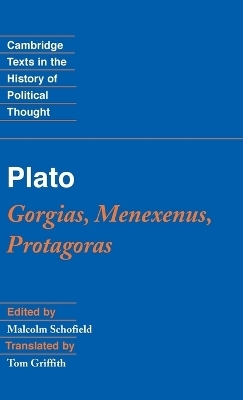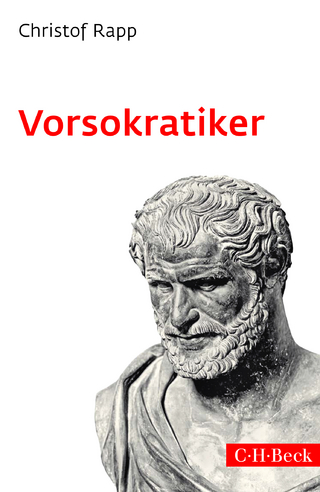
Plato: Gorgias, Menexenus, Protagoras
Seiten
2009
Cambridge University Press (Verlag)
978-0-521-83729-3 (ISBN)
Cambridge University Press (Verlag)
978-0-521-83729-3 (ISBN)
Presented here are three early Platonic dialogues in a new translation by Tom Griffith combining elegance, accuracy, freshness and fluency. Offering varied examples of Plato's encounters with the culture and politics of Athens, the dialogues are introduced and annotated by Malcolm Schofield, a well-known authority on ancient Greek political philosophy.
Presented in the popular Cambridge Texts format are three early Platonic dialogues in a new English translation by Tom Griffith that combines elegance, accuracy, freshness and fluency. Together they offer strikingly varied examples of Plato's critical encounter with the culture and politics of fifth and fourth century Athens. Nowhere does he engage more sharply and vigorously with the presuppositions of democracy. The Gorgias is a long and impassioned confrontation between Socrates and a succession of increasingly heated interlocutors about political rhetoric as an instrument of political power. The short Menexenus contains a pastiche of celebratory public oratory, illustrating its self-delusions. In the Protagoras, another important contribution to moral and political philosophy in its own right, Socrates takes on leading intellectuals (the 'sophists') of the later fifth century BC and their pretensions to knowledge. The dialogues are introduced and annotated by Malcolm Schofield, a leading authority on ancient Greek political philosophy.
Presented in the popular Cambridge Texts format are three early Platonic dialogues in a new English translation by Tom Griffith that combines elegance, accuracy, freshness and fluency. Together they offer strikingly varied examples of Plato's critical encounter with the culture and politics of fifth and fourth century Athens. Nowhere does he engage more sharply and vigorously with the presuppositions of democracy. The Gorgias is a long and impassioned confrontation between Socrates and a succession of increasingly heated interlocutors about political rhetoric as an instrument of political power. The short Menexenus contains a pastiche of celebratory public oratory, illustrating its self-delusions. In the Protagoras, another important contribution to moral and political philosophy in its own right, Socrates takes on leading intellectuals (the 'sophists') of the later fifth century BC and their pretensions to knowledge. The dialogues are introduced and annotated by Malcolm Schofield, a leading authority on ancient Greek political philosophy.
Malcolm Schofield is Professor of Ancient Philosophy at the University of Cambridge and a Fellow of St John's College. Tom Griffith has also translated Plato's The Republic, Symposium, Euthyphro, Apology, Crito, Phaedo, and Phaedrus.
Editorial note; Introduction; Principal dates; A guide to further reading; 1. Gorgias; 2. Menexenus; 3. Protagoras; Index of names; General index.
| Erscheint lt. Verlag | 19.11.2009 |
|---|---|
| Reihe/Serie | Cambridge Texts in the History of Political Thought |
| Übersetzer | Tom Griffith |
| Verlagsort | Cambridge |
| Sprache | englisch |
| Maße | 143 x 222 mm |
| Gewicht | 470 g |
| Themenwelt | Geisteswissenschaften ► Philosophie ► Philosophie Altertum / Antike |
| ISBN-10 | 0-521-83729-4 / 0521837294 |
| ISBN-13 | 978-0-521-83729-3 / 9780521837293 |
| Zustand | Neuware |
| Informationen gemäß Produktsicherheitsverordnung (GPSR) | |
| Haben Sie eine Frage zum Produkt? |
Mehr entdecken
aus dem Bereich
aus dem Bereich
mit Sokrates, Seneca, Platon & Co. im Gespräch
Buch | Hardcover (2023)
FinanzBuch Verlag
CHF 25,20


